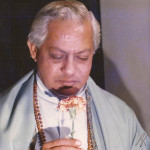The Divinity that is within you is non‑cognizable

GR: Bullshit! [laughter] Ahh [Sanskrit] That you are. Who am I if I am not the mind? Who am I if I am not the body? Now what makes you presume that you are not the body and not the mind. What point of reference have you to tell you that I am not the mind and neither the body? Show me that point of reference. Ahh! When I say to myself, «I am that I am,» who is this that I am that I am? Who is this Brahmas mi‑‑I am Brahma? Who is this that could say, «I and my Father are one?» Who is this that could say that I, as the mind and body, is non‑existent? Then what part of you is existent to make you cognize your non‑existence? You don’t know, that is for sure. Therefore, I said «bullshit.»
Your mind is a reality, your body is a reality, and the spiritual self within you is a reality, but it is only the mind that could cognize its own realness which is also, at the same time, erroneous. You say I am this body. Now this body has been changing so much. When I was an infant like our little baby there, hmmm, then l grew up into adolescence, became an old man… uh, I’m not too old really. [Laughter] So this body is the same body, but over a period of time ‑‑ which you regard to be time ‑‑ has gone through various changes. Like putting on a little meditational tummy or whatever. So my reality lies in my body and my reality lies in my mind, but who is that which perceives this particular form of reality.
The spirit that is within you, the Divinity that is within you, is non‑cognizable and neither would it cognize anything besides itself in its own cognition. In other words, the spirit cannot cognize itself and neither can it re‑cognize itself. So the mind says this is a handkerchief. Why does the mind say this is a handkerchief? (Might as well use it). Why does the mind say that this is a handkerchief? Because my mind, or a certain recollection or experiences that has gone through me in this lifetime or even in past lifetimes, perhaps, make me cognize this to be a cloth, a piece of cloth to be used on my nose.
Now, where does this come from? What tells you that this is a nose and that’s a handkerchief? So you go further back all the time, because once you recognize the nose and you recognize the handkerchief, you still got to go further to ask yourself the question that who is saying that this is a handkerchief and this is a nose. Who is saying that. And when you find yourself saying that my mind is saying that, then you will ask yourself what perpetuates this mind in this mold of having this particular kind of cognition.
And like that you go on and on and on until you reach a point which is zero. Then only can you say, «I’m not the body.» Then only can you say, «I’m not the mind.» And when you say I’m not the body and I’m not the mind, there again you go on and on and on asking yourself who is saying this that I’m not the body. Look, I can touch, feel, smell, taste, go to bed and make love, go to the toilet. Is the body then not functional? Of course it is functional. Then why do I deny the body?
I deny the body because I feel within yourself‑‑or rather some force is feeling within myself‑‑that I am far beyond the body and the mind. Now, the greatest mistake that has been made‑‑or is being made by various theologies‑‑is the denial of the body and mind. Let’s look at it from a different angle. Do not deny this body. Do not deny this mind. And do not deny that which cognizes the body and the mind.
So how are you dealing with yourself, then? We’re still going to come to the cognitive factor. But at this moment how do you stand? You stand in the position of saying, my body exists, my mind exists, and the cognitive factor also exists, so therefore I am existence and being existing I can deny nothing. For I am that I am.
Now, let’s perform some operations. Any volunteers? I’ll cut you up into pieces. I’ll put your body there, your mind there, and your cognitive self there. Get hold of a knife for me, please. [laughter] There is no differentation between your body and your mind and your cognitive self. The I that cognizes the very existence of this body and this mind is thought forms which we can call the ego self that is forever trying to preserve itself in the cognitive factors of saying I am this handsome guru [comments and laughs from audience]. Bull. That I’m this brilliant brain and this spiritual giant. Who’s saying that? That stupid ego self.
Now, what is the ego worth? The ego is worth nothing, because it is just a formation of patterns which you have superimposed upon yourself through the various experiences that you have gone through, and that has left impressions. And those impressions is that which we call the ego. Now, I put my hand on this table and I remove this hand. But an imprint is there. The hand is not there anymore, but an impression or an imprint of the hand is existing on this table. Get out your magnifying glass and you will see it. What reality is there in this imprint? This very imprint that cognizes me as a body, this very imprint that cognizes me as a mind. So my body and mind is totally dependent upon that imprint. And yet, what is the reality of this imprint? Nil. It’s an impression created through patternings of experiences.
So now if I deny this imprint, or if I do not attach value to this imprint in bringing about the recognitions of the existence of this body and this mind, then I am basing… you got to change your… let’s find a joke.
You know, there was this luncheon at one of the embassies, and a Chinese gentleman was sitting at the table and next to him was this young Englishman. So the Englishman somehow got the impression that the Chinese gentleman could not speak English. So during the dinner after the soup was served, the Englishman, thinking the Chinese man could not speak English said, «You likee soupee?» The Chinaman just smiled. So after these dinners, when it comes to embassies ‑‑ I’ve been to many of them so I know ‑‑ some of the people there are required to give a speech, you know, say a few words. So quite a few had to say something. And then the chairman or whatever you like to call it ‑‑ WC to me it doesn’t matter ‑‑ called upon this Chinese gentleman to say a few words. And this Chinese gentleman gave a beautiful talk filled with wit and wisdom. So as he was sitting down amidst this wonderful applause, he turned to the Englishman and said, «You likee speechee?»








Speak Your Mind